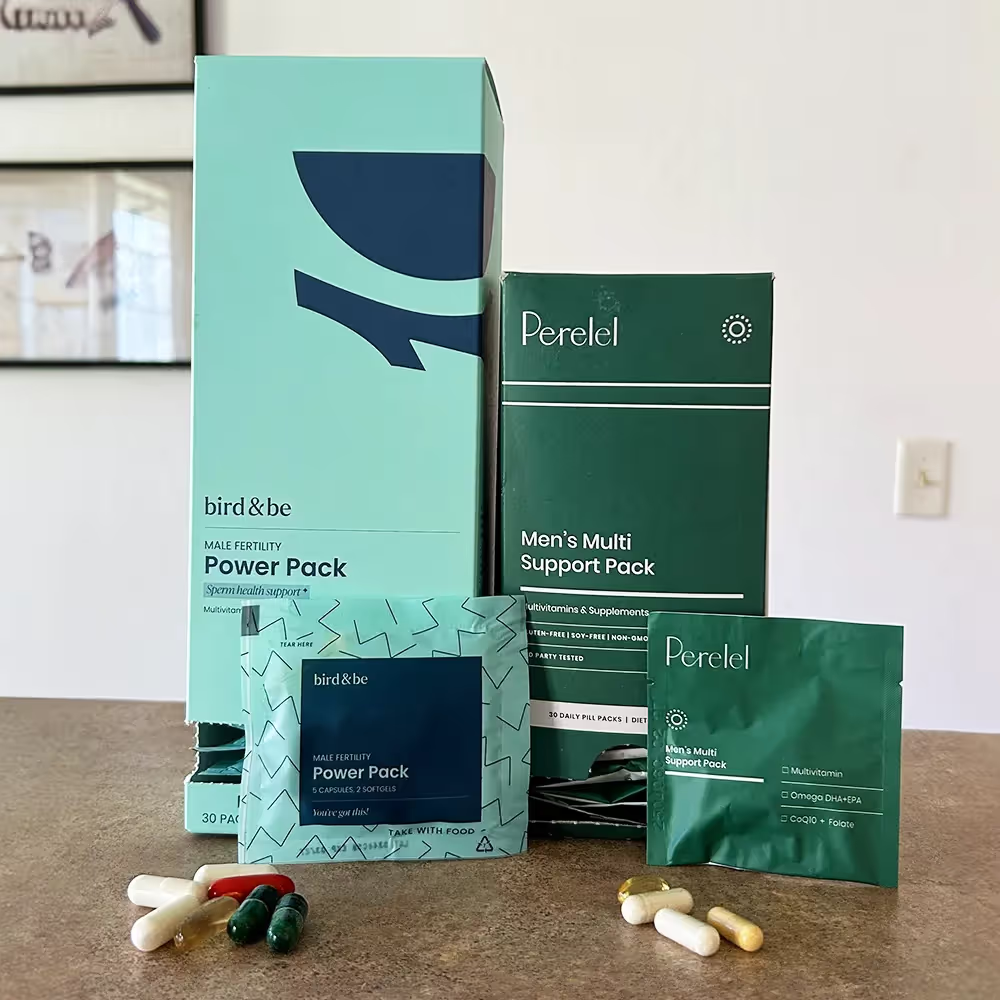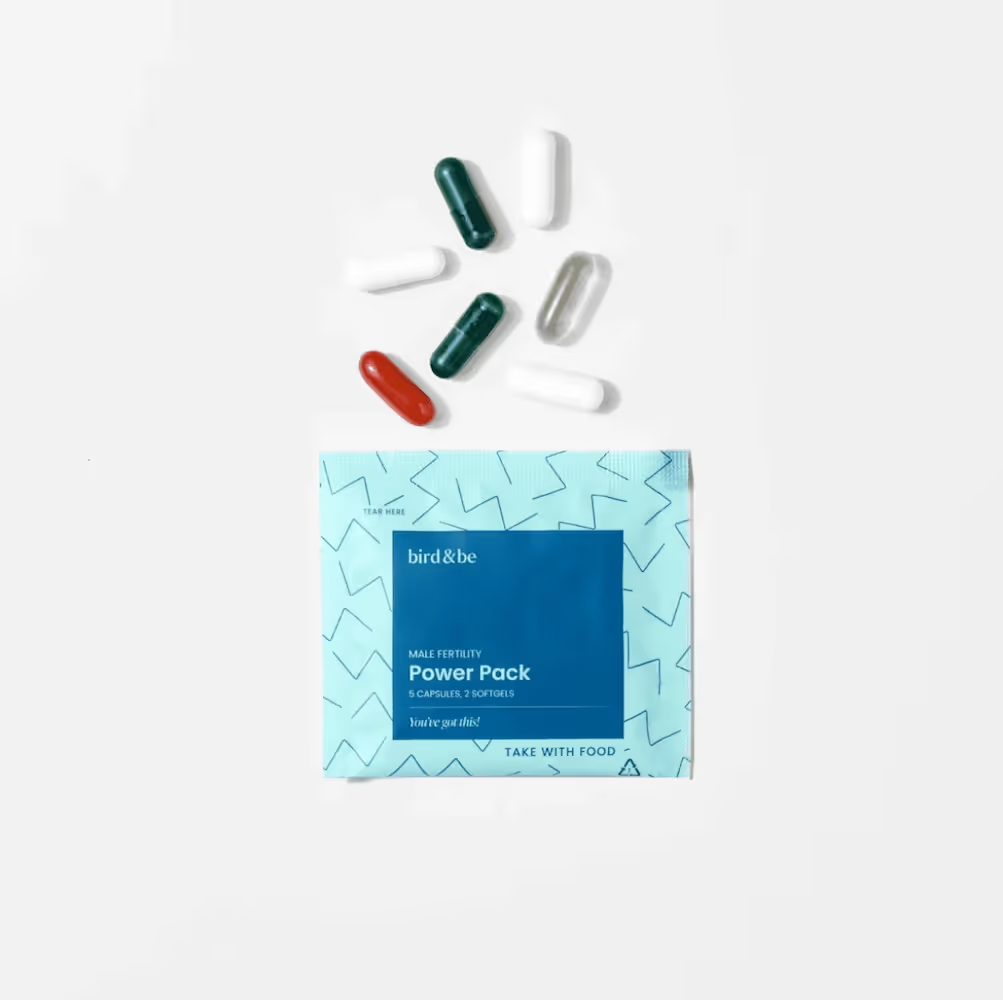In this review
Lorem ipsum dolor sit amet, consectetur adipiscing elit. Suspendisse varius enim in eros elementum tristique. Duis cursus, mi quis viverra ornare, eros dolor interdum nulla, ut commodo diam libero vitae erat. Aenean faucibus nibh et justo cursus id rutrum lorem imperdiet. Nunc ut sem vitae risus tristique posuere.
Lorem ipsum dolor sit amet, consectetur adipiscing elit. Suspendisse varius enim in eros elementum tristique. Duis cursus, mi quis viverra ornare, eros dolor interdum nulla, ut commodo diam libero vitae erat. Aenean faucibus nibh et justo cursus id rutrum lorem imperdiet. Nunc ut sem vitae risus tristique posuere.
Heading
If you’re trying to conceive, you’re probably tracking cycles, managing stress, and fine-tuning nutrition. But ladies, take note: research shows that men play an equal role in successful conception. In fact, up to 50% of infertility cases involve sperm-related factors.1
To help boost his sperm health, motility, and DNA integrity, Reproductive Endocrinologists recommend starting Male Fertility Supplements three months before TTC. Sperm take about 74 days to mature,2 so what your partner does now supports your chances of a healthy pregnancy later.
What supplements are best for sperm health? With insights from Dr. Mark Matus, a Men’s Health and Fertility expert, we compared the two leading all-in-one options - Bird&Be’s Male Fertility Power Pack and Perelel’s Men’s Multi - to find out which offers the strongest support for men trying to conceive.

What’s Going on with Male Fertility?
Male fertility rates have declined for the last three decades - but the issue receives little attention.3
“Most cases trace back to oxidative stress and lifestyle exposure like poor diet, smoking or vaping, alcohol, stress, and endocrine-disrupting chemicals like pesticides and plastics,” explains Dr. Mark Matus, our Men’s Health & Fertility expert. “But even healthy men accumulate oxidative stress from daily life,” he adds.
“A well-designed men’s fertility supplement is a low-risk way to support sperm quality during that 3-month preconception window,” says Dr. Matus, where sperm are still developing. In short, men should start supplementing as soon as they and their partners decide to conceive.
What to Look For in a Male Fertility Supplement
According to Dr. Mark Matus, a well-designed male fertility vitamin should target oxidative stress, energy production, and DNA stability - the three pillars of healthy sperm. Here’s what ingredients to look for:
- CoQ10: Improves sperm motility and concentration by powering mitochondrial energy.4 “Clinical studies associate CoQ10 with better total motile count and progressive motility,” says Dr. Matus. “I recommend at least 200-300 mg per day.”
- Omega-3 DHA: Clinical studies and meta-analyses show that DHA supplementation significantly improves sperm motility and increases DHA levels in seminal plasma, with potential benefits to sperm morphology and concentration.5
- Folate AND Folic Acid: Essential for DNA synthesis and repair, and has been shown to improve pregnancy rates when taken by men.6 It is important to include both forms of the vitamin - folate AND folic acid. “Some men carry MTHFR variants that reduce folic acid conversion,” Dr. Matus explains. “Including both forms covers all bases.”
- Antioxidants (A, C, E, NAC, L-Carnitine): Protects sperm membranes and DNA from oxidative damage.7 “NAC replenishes glutathione, and L-carnitine boosts mitochondrial function - both backed by data for motility improvement.”
- Minerals (Zinc + Selenium): Crucial for testosterone synthesis, sperm structure, and DNA integrity.7
Ingredient quality matters: look for third-party testing, cGMP manufacturing, and fertility-expert formulation.
Finally, consider HSA/FSA-eligibility for affordability.
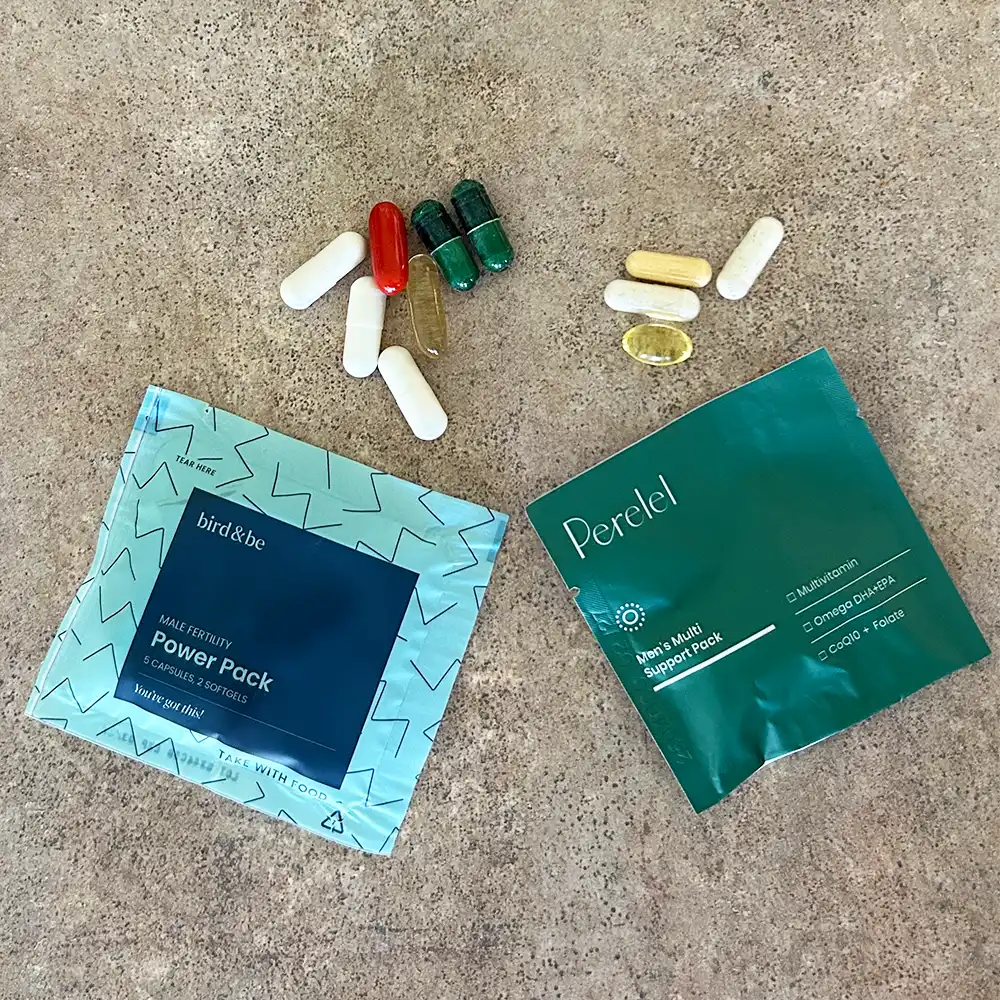
Let’s see how the top options for Men’s Fertility Supplements compare.
Bird&Be vs. Perelel: Which is Better For Male Fertility?
Green = category winner
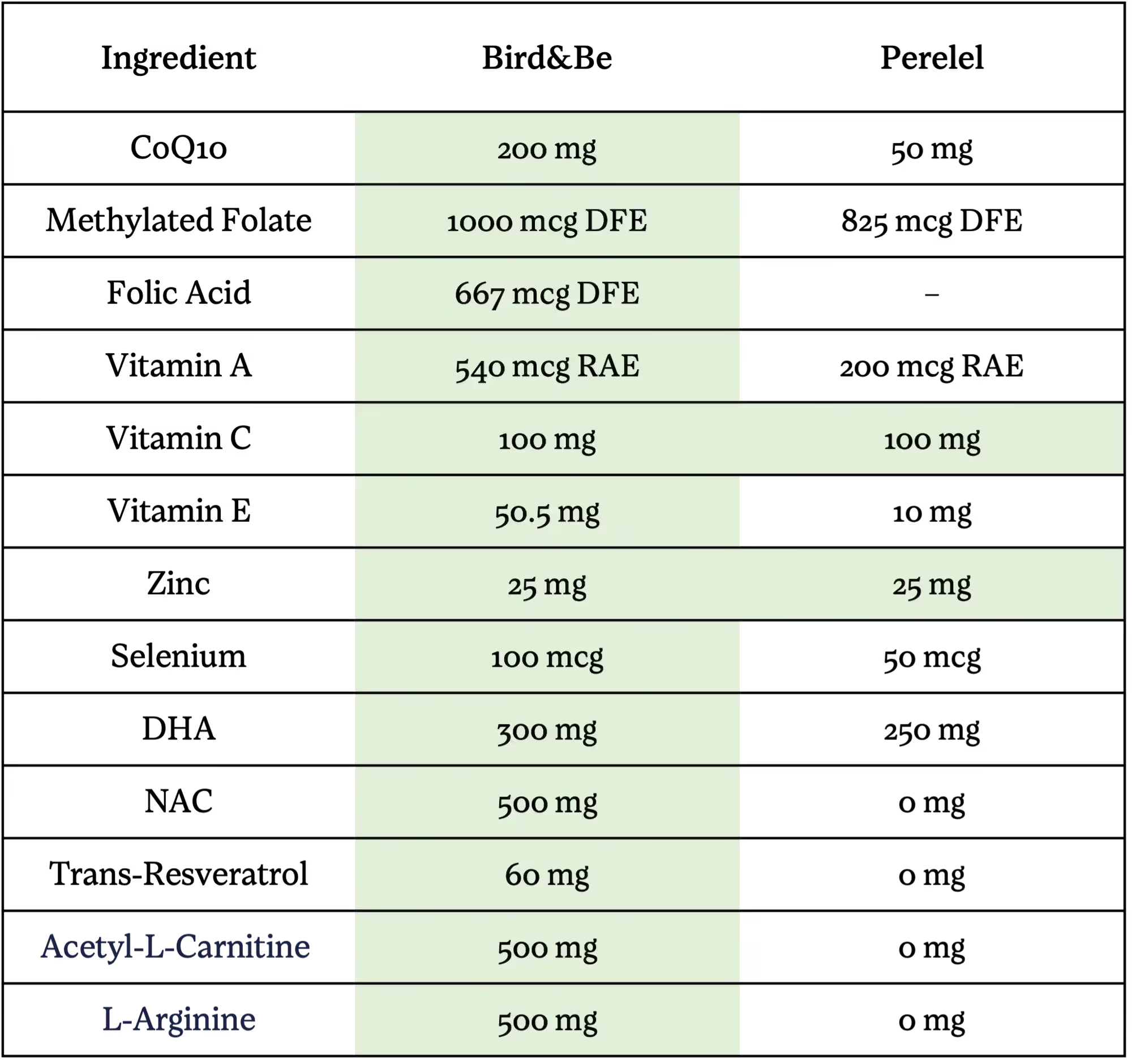
Ingredients: Bird&Be Wins With Targeted Nutrients For Sperm Health
Bird&Be is the clear winner, delivering research-backed doses of key fertility nutrients, including CoQ10 (200 mg), NAC (500 mg), L-Arginine (500 mg), L-carnitine (500 mg), and Trans-resveratrol (60 mg) - ingredients not found in Perelel.
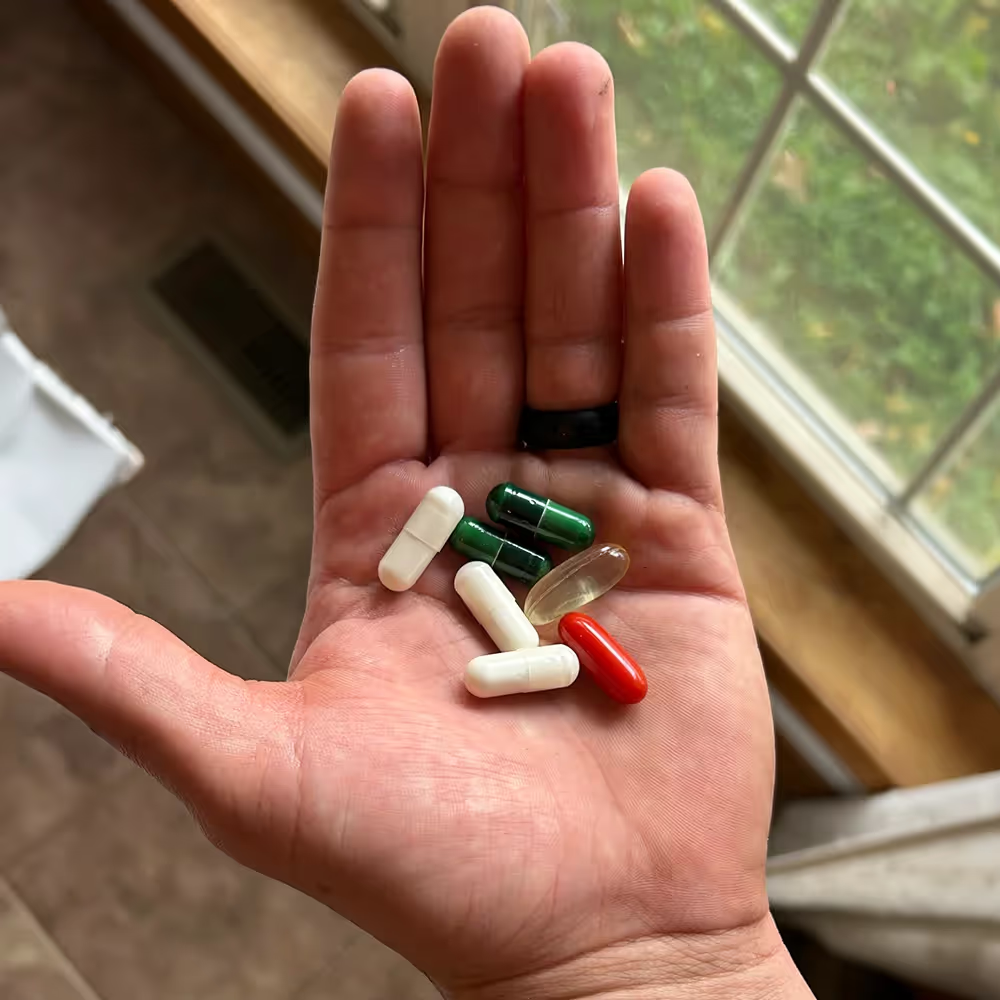
Bird&Be also includes both folate + folic acid, while Perelel provides only methylated folate. Finally, Bird&Be includes 2x more selenium (100 mcg vs 50 mcg), important for sperm motility and morphology.
“For men actively trying to conceive, I recommend Bird&Be because it’s purpose-built for fertility,” says Dr. Matus. “Perelel is a solid general men’s multivitamin, but Bird&Be’s profile is more targeted and aligned with the oxidative-stress and mitochondrial targets we focus on in male fertility.”
Price: Bird&Be Wins
At $48.20/month with code MOTHERFUL15, Bird&Be costs just slightly less than Perelel ($50.23/month).
Quality: A Draw
Both Bird&Be and Perelel are third-party tested and formulated by fertility doctors, ensuring safety and label accuracy.
Perelel’s products are made in FDA cGMP (Good Manufacturing Practices certified) facilities, and their Men’s Multi is tested for high levels of heavy metals.
As a Canadian company, Bird&Be follows even stricter Third Party Testing regulations, where every single capsule is tracked and screened for yeast, mold, microbial contamination, heavy metals and lead. It is also made in cGMP facilities.
The Verdict: Bird&Be is the Best Option For Male Fertility Vitamins

For men actively trying to conceive, Bird&Be’s Male Fertility Power Pack is our Top Choice. It delivers higher-dose CoQ10, additional antioxidants, and key support nutrients designed specifically for sperm health - in convenient, daily packs. Bird&Be is also rigorously Third-Party tested and designed by top fertility doctors.
TTC in 2026? Get 15% off Bird&Be with code: MOTHERFUL15
1. NIH: 50% of Infertility Cases Involve Sperm-Related Factors
2. NIH: Sperm Take 74 Days to Develop
3. BMC Public Health: Global Male Fertility Continues to Decline
4. NIH: CoQ10 Improves Sperm Motility and Concentration
5. NIH: Omega-3s Increase Sperm Count and Concentration
6. NIH: Folic Acid Reduces DNA Fragmentation, Increases Pregnancy Rates

